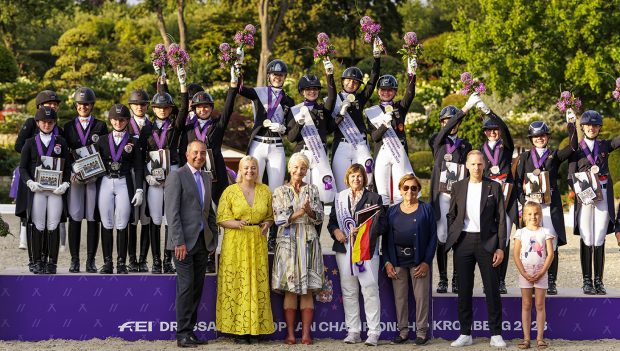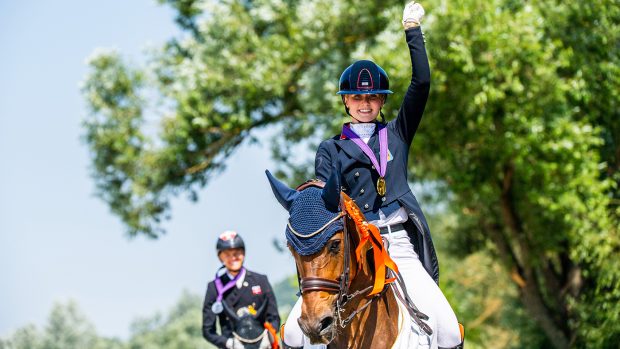H&H’s dressage editor ponders the unusual move that led to two teams winning silver on different scores at the recent junior European Dressage Championships
At first glance, the team podium photo from last week’s FEI Junior European Dressage Championships, doesn’t appear out of the ordinary. Take a slightly longer look, however, and you’ll spot something unusual in the crowd of young riders filling the silver spot.
Two sets of silver medals were awarded at these championships, in an unprecedented move that caused quite the confusion. Both Austria and Denmark walked away with a shiny silver, despite finishing on differing team scores – Austria on 214.469 and Denmark on 214.243. Germany won gold, while Britain took bronze on 214.03.
The source of the snafu was an error of course made by Austria’s Fanny Jöbstl, who rode two left walk pirouettes, and the fact the judge at C did not notice the mistake. Alice Schwab, heading up the judging panel, was the only one with the ability to ring the bell to notify Fanny of her mistake and, crucially, to allow her to repeat the second pirouette in the correct direction.
But the error wasn’t rung out, Fanny continued with her test, receiving very low marks for the incorrect pirouette, plus an error of course penalty. Her announced score put Austria into fourth, just off the podium. And then the mistake was realised, and an appeal lodged by the Austrian contingent.
On account of the judging error, and the fact that Fanny was not given the chance to redo the movement, it was decided to raise her scores for the incorrect pirouette to align with those for her other one, and simply apply the error of course penalty.
Her revised score was enough to elevate Austria into second position, theoretically knocking Denmark down into bronze and Britain, agonisingly, off the podium altogether into fourth.
Except it didn’t.
In a surprise move, the organisers, judging committee and single member of the Judges Supervisory Panel present conferred, then opted to give out two silver medals. Sponsors Avalon Premium Cars Kronberg admirably stepped up to pay out prize money for both teams, and all four nations went home happy. The British contingent, especially, was thrilled to have received the bronze medal that riders Myles Graham, Ruby Hughes, Isla Sully and Mette Dahl so deserved for their superb performances.
‘An insane shame for the kids’
But here lies the rub. Britain may have won bronze, but they didn’t finish third. And while tournament director Matthias Rath pointed out, quite rightly, that to drop Denmark and Britain down the order “would have been an insane shame for the kids”, it does raise the question: Would the same decision have been made at a senior championship?
It seems inconceivable that it would have. At senior level, Austria would almost certainly have won silver, Denmark would have received bronze and Britain would have gone home empty-handed, however much of a shame, and arguably unfair, that result may have been.
So was it the right decision? It’s a hard one, and something I have been pondering all week, not least because it did not comply with FEI rules.
In a statement regarding the junior European Dressage Championships supplied to H&H from the FEI, a spokesperson confirmed that “the matter at stake is a field of play matter and the FEI headquarters has no authority to change the results or to intervene.”
But they also acknowledge that “awarding two team silver medals to teams with differing results… is not in accordance with the FEI rules”.
“We wish to emphasise that the FEI rules and regulations have to be applied and complied with by all FEI officials. We expect that these rules are applied diligently and uniformly, ensuring a fair playing field for all participants,” the statement continues.
“The FEI will conduct a thorough review of all available facts, evidence, and reports related to the matter. We will liaise with the relevant officials to address this matter.”
Should youth riders be treated the same as seniors?
To me, the most interesting issue raised here is the attitude towards international youth championships. Should they be treated as any other FEI championship, and the same rules and decisions applied as per senior events, or is it appropriate for a softer approach to be taken?
Further complicating the matter is that the individual most at fault in this situation is not one of the riders, who, it is accepted via the existence of the error of course penalty, do sometimes go wrong in the heat of the moment.
Instead it was the judge at C, the highly experienced Alice Schwab, who was promoted to five-star status earlier this year. Of course, even the most experienced, diligent professionals are capable of human error, which is all it came down to in this unfortunate situation. But should that human error have been allowed to disadvantage other competitors?
Ultimately, all parties came home happy. And perhaps that’s what it’s all about, at the end of the day. Who knows what impact stripping the bronze medal they believed they had won might have had on the young British team members’ mentalities and attitude to competition.
But, on the other hand, competitive sport at this level isn’t supposed to be about keeping its participants happy, however young they might be. Would it have been more educational and constructive to have been forced to accept the tough, alternative outcome?
Then again, would that alternative outcome, that denied Britain a team medal based on others’ mistakes, have been any more or less “fair” than the decision that was made, with the riders’ best interests at heart? Maybe the FEI review into the matter will provide answers to that question. To me, that’s what it comes down to.
Because elite sport isn’t always kind. But it should always, always be fair.
You may also be interested in…

‘Beyond my wildest dreams’: British junior riders power to team and individual medals at dramatic Europeans

British rider makes history by being crowned double European champion

Britain’s youth dressage medallists – who are they and where are they now?

Being a champion in any sport takes more than just talent

Meet Nalegro – the young Valegro nephew who could give Lottie Fry a hat-trick of world titles

Subscribe to Horse & Hound magazine today – and enjoy unlimited website access all year round
Horse & Hound magazine, out every Thursday, is packed with all the latest news and reports, as well as interviews, specials, nostalgia, vet and training advice. Find how you can enjoy the magazine delivered to your door every week, plus options to upgrade your subscription to access our online service that brings you breaking news and reports as well as other benefits.


